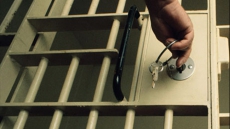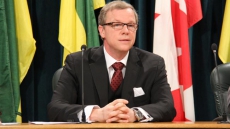VICTORIA - The proposed $7.9-billion Site C hydroelectric dam on the Peace River cleared major environmental hurdles Tuesday as the federal and British Columbia governments granted environmental certificates, but the decision to start construction won't be made until the end of the year.
B.C.'s Environment Minister Mary Polak said the province remains convinced building the dam is in the public interest and its benefits outweigh the risks of significant adverse environmental, social and heritage effects.
She made the announcement at a news conference, which was interrupted by an Environment Ministry official who confirmed that federal Environment Minister Leona Aglukkaq had just issued a similar statement saying Ottawa believes Site C's environmental impacts are justified.
"Our government is committed to making environmental assessment decisions based on the best available scientific evidence, and balancing economic and environmental considerations," Aglukkaq said in a news release.
The Sierra Club of B.C. called the decision flawed, warning Site C is a mega dam that will have impacts First Nations and the area wildlife that cannot be mitigated.
Opposition New Democrat energy critic Adrian Dix said the project should be subject to a review by the B.C. Utilities Commission, once standard in B.C., but the Liberal government's clean energy laws now allow some major projects to bypass the regulatory agency.
B.C. Hydro's Site C spokesman David Conway said the project has been undergoing public reviews and consultations with First Nations, communities and stakeholders since 2007.
"It's a major milestone for the project," he said. "It's been a long point to get to this."
A joint review panel report released in May concluded that replacing a portion of the Peace River with an 83-kilometre long reservoir would cause significant adverse effects on fish, their habitat, and a number of other species, plants and sensitive ecosystems.
The report also said the project would significantly impact the current use of land and resources traditionally used by First Nations and the effect of that on treaty rights would have to be weighed by government.
But the panel concluded that the province will need new energy and new capacity at some point and the dam would provide a large amount of inexpensive power that would be low in greenhouse gas emissions.
The dam would produce 1,100 megawatts of capacity every year, enough to power about 450,000 homes.
B.C. Energy Minister Bill Bennett has said that if the project were approved construction could start as early as this January, with a completion date of 2024.
The federal and B.C. environmental approvals come with more than 80 legally binding conditions that hydro must meet.
Polak said the B.C. conditions include establishing at $20-million fund to compensate for lost agricultural lands. The certificate also calls for hydro to develop a plan to compensate and mitigate changes expected in wetland habitat.
Hydro must also develop plans to work with aboriginal businesses and build up to 50 rental units in Fort St. John that will be used for project construction workers, but serve for local low-income housing needs once the dam is completed.
Polak said she expected a B.C. government decision on the project by the end of the year.
"Government, broadly, still needs to make a decision with respect to a final investment decision," she said.
The cabinet could decide to ask for more information on the project, which may delay a final decision, she added.
Polak said negotiations are currently underway with five of seven area First Nations. She said offers have been made to the two remaining First Nations but talks are not underway.
"We are of the view that there has been meaningful consultations with aboriginal groups," she said.
Recently, an area First Nation told both the federal and B.C. governments that it will not support two megaprojects in the Peace River area.
West Moberly First Nation Chief Roland Willson said his community has title to the Peace River Valley under a century-old treaty and it will fight what his people believe is over-development in the area.
Major gas pipelines would have to be built in the area near the proposed Site C dam if the B.C. government's plan to develop an LNG export industry occurs.
"If you want to push Site C, we're not going to be in favour of any LNG projects, any of the pipeline projects up there," Willson said.






